For the past several years of my life I have been trying to bring to market a superior video streaming platform with better technology than any well known streaming platform has. I started in 2012, long before many of the current market players existed, at a time when people were unsure if anyone would watch TV on the internet using programming channel guides like Sling TV has demonstrated they will. Yet I had a MVP demo app of Zenither made back in the early part of 2013, long before anyone else did. Over the past year we have been issued 10 patents, too.
This has been an uphill battle the entire time, as while we are competing with some of the largest companies in the world, we’re also having to compete against the poor decision making of many investors into this space. It tends to be that many investors in tech don’t really understand technology development as well as they believe they do. This is why companies like Quibi were able to raise a billion dollars despite having a business plan that required them to obtain millions of paid users in their first year of operation; that is an absurd requirement for any startup business to need during its first year of operation. The business was doomed from the beginning because its business model was completely unrealistic, and that investors did not understand this shows how out of touch they actually are with the market. It also explains why true innovation in video streaming is uncommon, with most streaming apps being a poor clone of Netflix with no unique features that improve the watch experience or increase monetization for content owners.
My startup Zenither is unique in that we focused on building excellent technology designed to address common problems everyone has with video streaming. It solves problems for audiences, content owners and advertisers. And we didn’t need to spend tens of millions to develop it; we developed it for a fraction of what our competitors spend into development.
Below is a video where I prove it does not cost millions to develop this kind of technology. It can be done for $1.2M. We have apps for mobile (Android and iOS) and web browser (optimized for Chrome). We also have partially finished apps for Roku and Android TV but without more funding we could not complete them. Engineers need to eat you know and I’m not an engineer myself, we have to hire these engineers.
Getting the caliber of engineers necessary for quality work on your app requires money, but not nearly as much as VOD startups claim to spend into development to produce far inferior applications. They are wasteful and rip off investors, spending far more money than many of their apps will ever generate in actual revenue, especially since their business models tend to rely on getting additional funding since they are not expected to be profitable for decades.
By contrast, using the business model of Zenither we could actually be profitable within 2 years. This is because once we get to scale the costs of content licensing are shifted to the content owners themselves, not Zenither. This is the kind of business model that Facebook and YouTube use. We simply built a better platform for content owners to monetize their content which would mean once we had at least a million free users to watch the AVOD (advertising video on demand) content, many YouTube creators would switch to Zenither where they can see accurate, extensive demographic reports about their audience and directly sell ad inventory. Channel owners using Zenither can even set the starting bid price for ad inventory sold programmatically, which means they can stop having ad inventory sold for lowball $1 or $2 CPMs. If for some reason ad inventory is not sold, the ad spot will show a bump from their station instead so they can promote other shows and content they own.
I have written extensively about the features and advantages of Zenither on our now failed Reg CF campaign on Fundme; if you want an overview of all of that, please read that listing. As the campaign is now over you cannot make a micro investment but you can at least see what we have developed and accomplished with far less resources than companies like Quibi had.
A large part of this article is going to discuss problems I see in the video streaming market and mistakes that many companies are making, but before I get into that I want to share why our Reg CF campaign failed.
Why We Turned to Reg CF and Why the Campaign Failed
We had an uphill battle trying to raise capital through all the channels we have tried. As mentioned in my video we were trying to raise our second round at the same time Quibi was raising capital, and I frequently was told that people thought Quibi was going to be the next big thing. Quibi received tons of money from big companies, but it also resulted in many angels and VCs not wanting to make any investments at all into the market. People’s attitude has been that they should only invest into one of these video streaming startups and they want to only invest into the “sure winner”. In their minds whoever raises a lot of money is sure to be a success, so they couldn’t imagine Quibi failing after raising a billion and being helmed by Katzenberg. I tried in vain to explain Quibi’s business model was completely unrealistic and that it would be smarter to invest less money (we are only seeking $5M) into Zenither, which has a more realistic business model and far better features but Katzenberg’s experience as a successful media executive made it difficult for people to think logically about this business. Many investors are what is called a ‘star fucker’, and they fixate on the fame of entrepreneurs moreso than whether their business actually makes sense. This is why scams like WeWork and Theranos are possible but it is also why companies like Netflix which will never be profitable continue to keep raising capital.
I have been told by numerous parties that our business plan is one of the best they have read but we ultimately do not get investments because VCs and angel groups won’t take a risk on a startup that hasn’t already gained mass market adoption, unless it is helmed by someone famous like Jeffrey Katzenberg. This is a short sighted policy that led to a huge losses for the groups that made the deal with Quibi, because people like Jeffrey Katzenberg thrived in a market where monopolies can exist (traditional television and theatrical distribution) but their experience does not translate as well to a free market such as what the video streaming industry is. The reality is that numerous YouTube channel creators producing videos in their bedrooms have larger audiences than many A-list Hollywood talent do and the vast majority of A-list talent do not understand how to translate their own success into this market. By contrast my previous startup was a YouTube MCN so I understand this market very well, and I built Zenither to fill the needs of this market.
The key word here is ‘needs‘. Most video streaming startups do not understand the needs of content owners in internet video streaming because they are not ran by content owners themselves, or if they are then they are ran by people who are seeing the app as a means of only distributing their own brand. They want to build islands unto themselves, usually fixated on some niche like documentaries or indie films or what have you. The market has a lot of these platforms. They imitate Netflix’s business model without having a full understanding of its drawbacks and how without a constant flow of investment capital the company would go bankrupt.
Netflix has been around for twenty years — it’s never going to be profitable with the way they spend on content. Their business model is predicated on the belief they can always raise capital based on their fame alone. A business with 167M users paying recurring revenue subscription is unprofitable by design yet people ignore this obvious problem on the belief maybe someday it will be profitable. Yet it never will be, as Netflix is not designed to be profitable. Holding onto their stock expecting to get a dividend is unwise, and its junk bonds will need to be paid back by selling more junk bonds, which will transform Netflix into a kind of Ponzi scheme.
This is the problem with a business model based on having to fund so much original programming in order to retain subscriptions. Unlike cable companies, the costs of content are not distributed evenly among the channel owners and must be absorbed by Netflix. By contrast Zenither uses a business model more like a cable company does, and it is also the business model similar to what YouTube does where costs of programming are put forth by the channel owners themselves. As this is a proven sustainable business model for new content development, this is the model Zenither uses. The only drawback is that we first must license some content and pay for marketing to acquire enough users to draw those channel owners to use our platform, as the majority of channel owners will not use a platform that doesn’t have enough users to justify the expense (of both time and money) into managing a channel on it.
I had hoped that turning directly to consumers and indie content owners we could reach people that understood this about Zenither and see its potential. Unfortunately to reach them requires paying money, as organic forms of marketing are cut off from us by competitors who secretly run the groups on sites such as reddit, which are devoted to discussing streaming apps (I’ll talk more about this later in this article). So we hired an agency and had a budget to do paid advertising for our Reg CF campaign through them, using their experience.
Unfortunately the agency made huge mistakes in the setting up of our campaign; they spent half of our ad budget advertising a dead link. They then refused to provide a refund on what money they mis-spent. This doomed us and is the reason why the campaign failed.
For proof, here are some emails from where Facebook customer support explains the problem that happened with the ad campaign they ran for us,
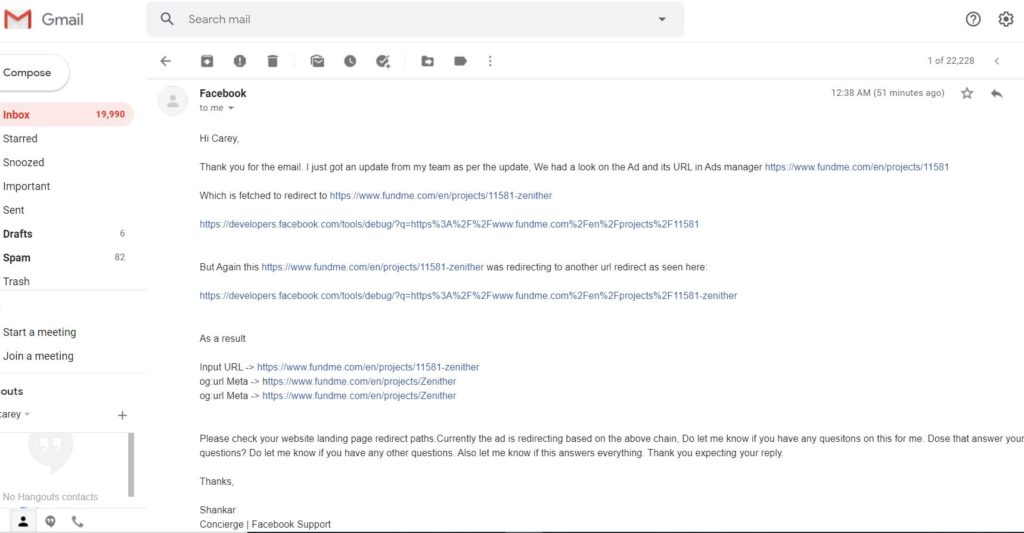
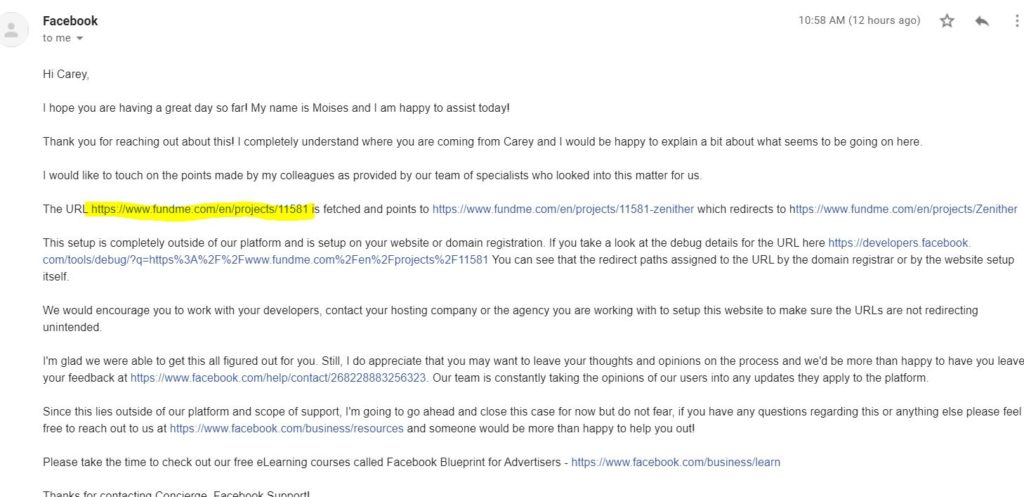
The problem was that Fundme had setup Cloudflare incorrectly, which nobody noticed when accessing the pages using a web browser but did impact the way that Facebook fetched and stored URLs for websites promoted in ads. If you entered the URL for our Reg CF campaign into the field for promoting the ad, Facebook would change it based on the redirect metadata stored on Cloudflare. You would only see this if you actually clicked on the ads, though — which obviously nobody at the ad agency running our campaign had bothered to do to ensure everything was working properly.
When I pointed this out to the ad agency, the person responsible for our campaign denied this had happened with the campaigns she ran and refused to provide us a refund. This meant we lost half our ad budget. I was particularly upset about this, because during the first day of the campaign running I thought it was unusual we had received no comments or any kind of engagement on our ads even though we had spent over a thousand dollars on the ads. In my experience spending even $50 on ads on Facebook to a correctly targeted audience results in hundreds of likes and comments. Yet we spent considerable money and received zero engagement, and the reason is because the link they promoted was broken the entire time.
When I raised the concern about the lack of performance, the person managing our account swore up and down that we just needed to keep spending money, so their self-learning AI software could better optimize the campaign. They insisted we had real people visiting the site, even if our analytics to the Fundme page didn’t show that. I made the mistake of trusting in her and the reputation of the agency, instead of canceling the campaign immediately. I knew something was wrong but without any specific evidence of what was wrong, we kept wasting money promoting a dead link due to the careless mishandling of our campaign by this person.
I’ve thought about whether I should say the name of the agency that screwed us over and resulted in our campaign failing. I’ve decided to reveal that name of the company is Rogers & Cowan, because I want people to understand we didn’t hire some kind of fly by night agency. We hired one of the largest agencies in the world, who does a lot of paid advertising work for other film and TV companies. Yet they screwed up our campaign by not checking the ads to see the experience of the user in coming from Facebook to our campaign site, and I didn’t see the problem until I clicked on one of the ads myself, but only after we had wasted half our ad budget with them. Then they refused to acknowledge the problem — even with emails from Facebook customer support — and provide a refund for their mistake. This doomed us, as the Reg CF came at considerable expense. I spent about $25K just setting up the campaign page itself, in addition to what we lost paying the agency’s retainer and what was spent into the actual paid advertising campaign. That money could have kept us afloat for another year, and now we have to shut down the servers.
I can only imagine that other clients of Rogers and Cowan may also have mishandling of their campaigns which goes unnoticed by their larger clients, since companies usually do many kinds of marketing. Although it is true that a mistake in Cloudflare setup is very unusual so perhaps this was an isolated incident? Regardless our campaign failed because they wasted our ad money promoting a broken link because no one on their end bothered to actually click on the ads to see if they were working properly, and every time I raised a concern about the poor performance of the ad they told me to just keep spending money so their “self learning AI” could find the investors for us.
I did attempt to do the paid advertising myself using my own experiences with doing small ad spends on Facebook but I couldn’t get a good ROI on my ads. I spent $100 and received $200 back. With that kind of conversion I’d need to spend $500K into advertising to raise a million, and since we didn’t have any budget now for testing different audience targeting to find a better ROI ( since Rogers & Cowan employees had wasted half our ad budget promoting a dead link) I gave up on the paid campaign.
Another tactic we tried was using a bot to send automated messages to investors into various entertainment related companies. Using this method was more successful than the campaign Rogers and Cowan did, as I did do some pitch demos to interested investors through this tactic, but they didn’t turn into any deals, for the same reasons I have previously explained on why we’ve had difficult convincing investors to fund our next round. Many just cannot get over the fact Quibi was such a failure, and they feel investing into a startup with low user numbers is “risky” even though getting users is the easiest part since it just requires money. The hardest thing to get is good technology to support a scalable business model, and that had to be built and then patented to be scalable in this industry, since without patents they can just rip you off and you have no recourse.
But most investors don’t value innovation and they don’t value business models; what they really value is fame and pre-existing success. It is very difficult to find investors willing to take a chance on a technology play in the current market. Some investors who don’t really understand the space often suggest we become a strictly B2B company, thinking we can just license our tech out and collect a fee, using a SaaS model. The problem is that while Netflix clones have a market and many companies exist that provide a cheaply, poorly made apps to wrap their content in, the market really cannot support this type of model. B2B SaaS OTT companies rise and fall like flies because there simply isn’t enough content owners in the market who want to pay thousands a month for apps that don’t generate that revenue back. The top media companies usually build their own apps to gain mass volume of users, and smaller sized content owners (such as film distributors) seek to license their content to these other companies for streaming on these apps. That’s how the business works. Small media owners with their own apps can’t really get the viewership to thrive in this market. Zenither is ultimately a multi-channel play, and it requires multiple channels for its business model to work. And no one is going to pay to have a channel on a service we run; MCNs are supposed to pay channels for being on their networks. That is how this business operates.
While I do think that there is an opportunity for licensing Zenither’s platform to different regional operators, it still has to operate as a multi-channel network provider since that is what the platform is expressly designed to function as. That is what it is designed to do. I’ve had conversations with parties who have expressed interest in licensing our platform for different country regions, but they have not been willing to pay the licensing fee we require to actually be able to provide support to them. These people seem to think they can get a million dollar platform with a revenue share deal alone, and we need to eat the cost of providing them support for their white labeled version. But that is not realistic — as I said before, many media content owners don’t actually understand the technology side of streaming video, and have unrealistic expectations.
(As a side note, the number of CEOs who try to rely on their I.T guys opinion on our platform is baffling. Even most experienced I.T. executives know little about software development, let alone software development within a specific niche such as video streaming. While they can understand what they are looking at because our software is easy to use — due to our excellent GUI design — asking them to judge how the machine is working under the hood is a lost cause, unless they are the rare I.T. professional who has software development experience. Most don’t.
I.T. guys shouldn’t be CTOs at media companies in this day and age; you need actual software engineers in that role).
It should go without saying the cancelation of key events such as SXSW due to the covid-19 epidemic has also hurt us. Even though we now have 10 patents, I can’t meet with anyone physically about our startup. I have to do pitches remotely to individual investors who read my unsolicited emails and LinkedIn messages. This is much harder to do than just attending organized pitch events for startups or even attending things like NAB Show. I’ve done probably 1 or 2 pitches for every month this year, and that is way below the norm of what I did the year before when Los Angeles was not in lockdown mode. Meanwhile we continue to have company expenses — mostly related to maintaining the servers — of over a thousand dollars a month, all having to come out of my own pocket.
I just can’t do it anymore.
I also want to throw out here an example of difficulties of trying to organically get the word out about a video streaming startup not funded by deep pockets. This is because I’ve often had people say to me “just grow organically” — well, it’s rather impossible to do that when you get banned from the communities you need to share your content in.
Here is an example from the r/cordcutters community on reddit on what I mean. This community originally was created for people who were illegally streaming satellite TV channels using open source software, but a few years ago I believe it was taken over by some agency that heavily pushes Pluto TV while making token efforts to promote other competitors as a way of lead generation for the community. Essentially, astroturfing marketing, as most large reddit communities are used by moderators to do.
I don’t know if it is ran directly by Pluto TV or just some agency associated with them, but the change over the years is very noticeable. Over time r/cordcutters has become a very large community on reddit for people talking about streaming services.
And they ban us when we try to share info about Zenither into this community. Here is an example,
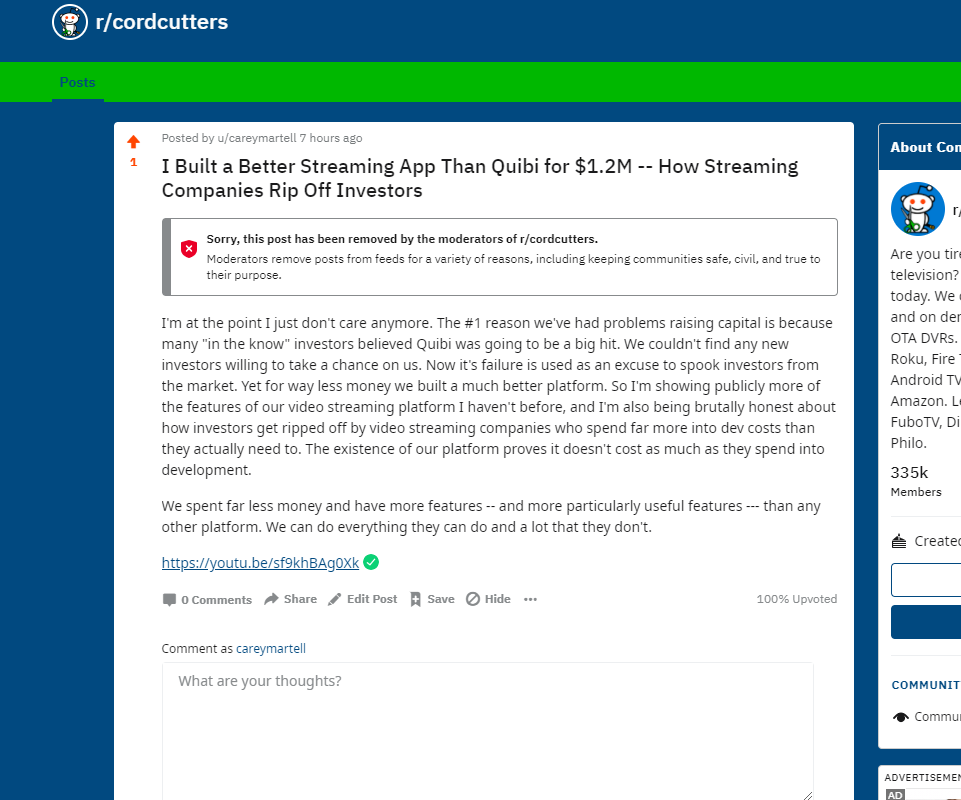
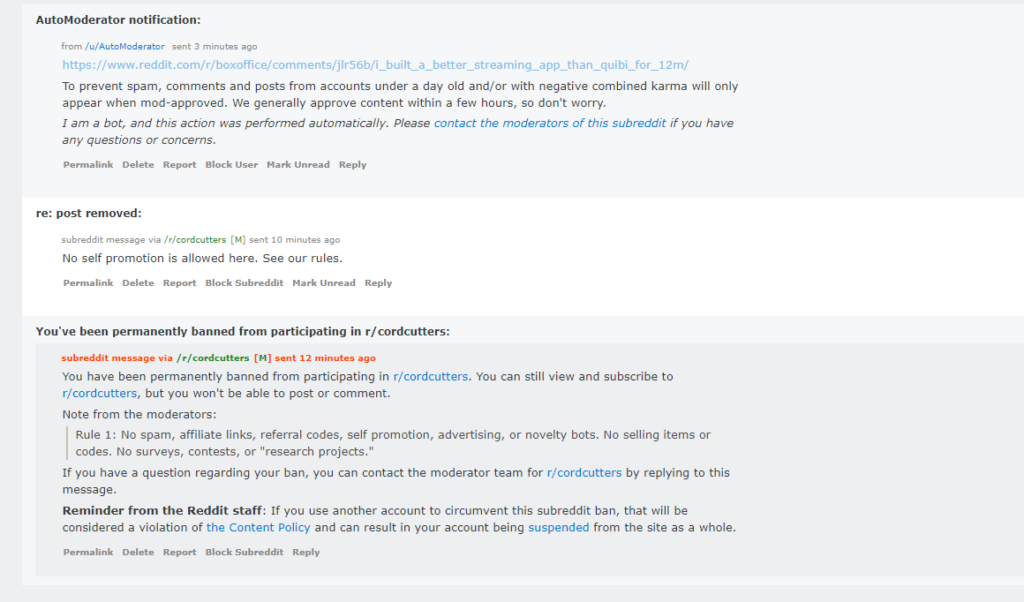
Here are the mods from r/cordcutters removing my post and perma banning me from the subreddit for “self promotion”. Yet their subreddit has hosted many posts from other VOD publishers, even allowed AMAs from other founders of video streaming platforms.
My experience has been many online communities about cord cutting are ran by astroturfers that only cover some of the competitors of the startup that actually controls that community so they are not too obvious about the astroturfing, while banning other startups like us so we cannot grow organically. You can’t grow organically if people get banned whenever they share your app in communities of people that use that kind of app.
They use their rules selectively to censor some and not others, while themselves operating the entire subreddit as a promotional tool for their own ventures. Many subreddits are like this, especially many of the most popular ones. A lot of them are moderated by astroturfers at ad agencies or sometimes even companies themselves, and they only share content from large competitors as a means of cross promotion to attract more people to their communities so they can grow their lists. This is also commonly done on other places, not just reddit. It’s done on Facebook groups, too.
The truth is, the reddit platform has rules against “self promotion” but these rules are only enforced selectively. By using fake accounts that pretend to be real people, companies frequently bypass the rules and operate entire subreddit communities that exist solely for their own self promotion. The only people punished on reddit for self-promotion are those who are honest about their self promotion, which means reddit’s policies encourage companies to deceive consumers.
Think about it. What incentive is there for people to be free moderators of large communities? There obviously must be something they get out of it, and it’s not just the thrill of being an internet janitor. There is nearly always something the person is specifically being rewarded for that justifies the time investment, and the most common reward is that the moderator is actually an employee at an agency and the community exists for that agency as a promotion tool to drive traffic to client’s websites.
Anyway, I later logged into this account to discover it had been permanently banned from the entire reddit website by a reddit admin for ‘harassment’. It seems clear that the moderators of r/cordcutters decided to abuse some clout at reddit to get my account perma banned from the site, as I had only made two posts and no comments using this account, and I haven’t otherwise used reddit in months on any other account I own.
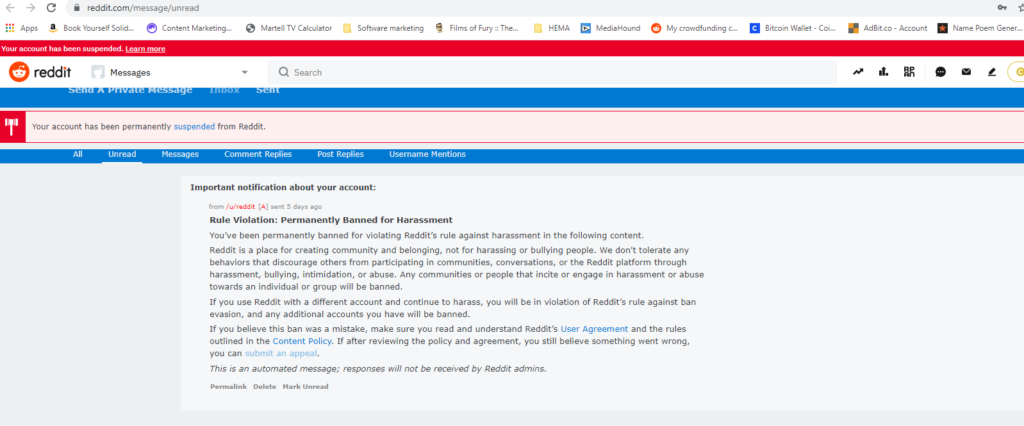
The banning is absurd; the account only has two posts, both of which were removed by moderators using ‘self promotion’ as the justification. No comments were ever made and the only PMs sent were protests to moderators for removing the posts.

The banning of my account that was only used to submit my video about Zenither is obvious moderator and admin abuse, no doubt as a result of the deep pockets and connections the owners of the r/cordcutters subreddit have — which serves as more proof that the subreddit is controlled by some agency associated with Pluto TV.
It is far too easy for businesses with the right connections to get competitors banned from the reddit platform, as reddit has lax hiring practices and does not moderate its employees for abuses of its system. It, much like Google, has few systems in place to prevent employees from abusing their positions to harass users of the platforms.
reddit has become more willing to allow employees to ban communities over the past year under the justification that many tech companies use — to ban over political wrongthink — and this results in a slippery slope where bannings for commercial gain inevitably result. Yet in this case it had nothing to do with politics — my account was perma banned as a favor to whoever the moderators of r/cordcutter really are.
I tried appealing it, thinking there might be some chance of a mistake. Perhaps a glitch of some kind? But no, the mysterious “anti evil operations team” at reddit claimed it would not be reversed.

I find it ironic that the self-righteous label themselves as the “anti evil team”. It seems very dishonest here, kind of like the People’s Republic of China calling itself a republic when it is obviously not. Your actions define what you are; you can’t just call yourself ‘anti evil’ to avoid the reality of your evil actions. And reddit is certainly an evil platform, and this interaction here is an example of why they are evil.
(I’ve previously written about problems with reddit and how it makes the world a darker place; you can read my post about reddit’s AskHistorians subreddit and my article, Programmatic Advertising on User-Generated Content is a Fundamentally Flawed Business Model That Makes The World Darker)
I think it is rather revealing that they feel so threatened by Zenither as a technologically superior platform that competitors would go as far as having a brand new reddit account perma banned from reddit as a way to reduce our ability to spread awareness of it.
I could give more examples but it would overwhelm and distract from the other things I want to talk about in this article. Maybe I’ll put them into a future article.
The point here is that if your app is threatening enough to the powers that be, they will throw up roadblocks preventing you from using organic means of promotion. This has happened to many other startups too, notably Gab. And it happened to Zenither, too.
Other Problems in the Video Streaming Market as I See Things
Before finishing this article I just want to toss out a few criticism I have of our competitors, and other ways I think they are mismanaging their platforms. This might reveal to you more of how Zenither could have went had we gotten our 2nd round of funding.
Drip release of programming vs binge watching
Binge watching model used by Netflix is the #1 reason why the business model is unsustainable. It dramatically increases their programming costs and in my opinion, unnecessarily so.
I believe Disney+ has the right idea in that drip release of content on a weekly schedule is the best way to do business. This is how TV stations have operated for decades. Netflix’ “innovation” of binge watching an entire season in a weekend resulted in high churn where subscribers would unsub after a month of watching all the best content. Netflix’ solution to this problem has been to just spend wildly on content, releasing so much content it’s impossible to watch it all but this leads to Netflix having quality control issues, which damages its brand and inevitably leads to loss of subscribers. There is such a thing as too much choice if the good content is buried beneath a sea of garbage.
As an example, Netflix hasn’t produced a show this year that I’ve really enjoyed. If it were not for that I have subscriptions to competitors to keep track of what they are doing I would have unsubscribed from them years ago.
The other drawback is Netflix is burying itself under a mountain of debt it will never pay off. There aren’t enough households in the world for Netflix to get to subscribe for them to make back what they are spending into content. They will continue to pile on more debt they can never pay off until investors finally realize Netflix is (ironically) a house of cards that will tumble over but not before all the execs, lawyers and production companies have milked those investors for billions. Some of their execs individually get millions in salary, and this is nuts for a company that hasn’t been profitable for the two decades it has been around.
Poor content investment decisions
One thing that Disney is doing wrong with Disney+ is their choices in content they are producing for it. With the exception of The Mandalorian and The Imagineer Story, everything else that has specifically been produced for Disney+ is garbage. The Lady and the Tramp remake was bad, as was the Mulan remake. This was also why they underperformed; those who did watch them, didn’t like them enough to share them and get the viral buzz needed to get new attention to them.
Disney+ ultimately is a collection of old Disney content, which while good is content that a lot of people can find free to watch illegally. They can also find that content in the many DVD releases that most parents and grandparents have for their kids. Disney+ should have released some of the harder to find programming, like its old pre-1995 Disney channel content and more of the classic theatrical shorts from the golden age of Disney. They’ve instead focused on uploading their library of post-1990s low quality sitcoms that cannot stand the test of time. This demonstrates to me the people at Disney+ don’t really understand what their audience most likes about the Disney brand. There is still Disney content illegally uploaded to YouTube with millions of views that isn’t available on Disney+, because the people managing the Disney archives don’t seem to have a full grasp things. I think a lot of people at Disney relied too heavily on the parks as a source of revenue and the monopoly of the traditional box office and cable TV model to spread the Disney brand — now that the world has changed to where the parks cannot be used as shopping malls for Disney products and they face fierce competition from new media influencers for eyeballs, Disney is struggling to maintain itself under the weight of its costs.
I mean, Disney+ not even having episodes of the new DuckTales reboot (which is massively popular) tells you pretty much everything about how mismanaged Disney+ is.
The people running Disney+ and by extension, other apps like Hulu, don’t really understand the market needs. That is why the original programming is doing so poorly and why the apps are cheap knockoffs of Netflix with no real innovation.
Another problem is companies like HBO and Netflix going all in on trending social issues. This I think this has damaged their brands, too. The show Watchmen is a perfect example of a terrific opportunity wasted by injecting current political topics into the narrative that had nothing to do with the original premise — indeed the entire show has basically nothing to do with the Watchmen comics.
The majority of audiences do not want to be preached to about current social issues when watching a fantasy comic book media show — they want escapism. The main reason people watch TV shows and movies is for escapism from the very social issues the producers are injecting into these entertainment products. It reveals the producers are out of touch with the audiences when they do this stuff, as they don’t understand why people watch fictional TV series in the first place.
HBO has not had a show with universal escapism appeal since the disastrous mishandling of the final season of Game of Thrones and that is why they have lost subscribers. It’s also why Netflix is losing subscribers, too, since they have mandated that all original programming has to be “diverse” — and by “diverse”, what they really mean is showcasing alternative lifestyles that the vast majority of audiences do not support. It’s gotten so bad that cartoons like the She-Ran reboot, which were supposed to be for young kids as young as six, featured bisexual polygamist couples and plots centered around sexual relationships of characters. Having any kind of mention of such relationships is very unusual among children’s programming, and certainly not something the majority of parents will support. Many Americans are viewing this as intentional attempts to indoctrinate children into fringe lifestyles that ultimately lead kids to unstable relationships and even child abuse within poly relationships. It is irresponsible for TV producers to encourage this stuff in children’s media and Netflix’s short-sighted obsession with injecting these social issues into its programming with the intention of making them always positive (when in reality they are frequently not), is turning people off from the platform.
The strategy that made Disney one of the most lucrative media companies in the world — the focus on family friendly programming — has been disregarded by Disney and many of its competitors. Yet this is the content that receives the most viewership and builds the most brand loyalty, as it is the content with the most universal appeal. The programming has be high concept though — it needs to still be excellent story telling.
The programming strategy championed by Michael Eisner in the early days of his Disney tenure that focused on family friendly, high concept, modestly budgeted productions with known talent (former A-listers in Eisner’s case; influencers today) is the most effective way to develop new original programming for the video streaming market. That’s what I wanted to do with original programming for Zenither.
Closing Thoughts
I am shutting down the servers on Zenither. We’ve operated for two years in an open beta state, and proven the technology is reliable and scalable. Unfortunately we cannot acquire the necessary users everyone wants to see from us until we have funding so we can license quality programming and do paid advertising to get installs of our app. There is no way to grow organically, because as I point out we are banned from communities that are used to grow organically since competitors built those communities to astroturf.
The reality is that the video streaming market is expensive to build a new startup in, and my key strength as an entrepreneur has been my talent at organic growth hacking. Without the ability to do this I have had a lot of challenges in marketing Zenither, as the usual ways I do so are unavailable to me since we cannot license quality programming I could SEO for, and we cannot share information about Zenither into social media groups about video streaming.
It’s frustrating for me, because I know the way that we built Zenither is the way that all future video streaming platforms will work. We’re positioned well for that future with our patent portfolio, too. Yet without further investment we are unable to capitalize on this future.




